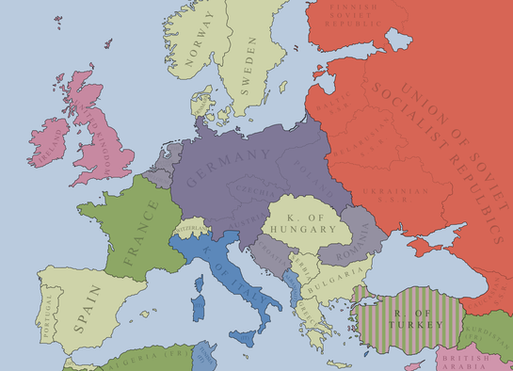HOME | DD
 MattiafromEsperia — Happy Willy: Map of an alternate world
MattiafromEsperia — Happy Willy: Map of an alternate world

#mapping #alternatehistory #bismarck #cartography #germany #mapmaking #alternate_history #mbam #germanempire
Published: 2021-06-30 19:14:03 +0000 UTC; Views: 16378; Favourites: 116; Downloads: 27
Redirect to original
Description
In this timeline during the ten days' campaign the Netherlands managed to ensure Prussian support. Since France wanted to avoid an unnecessary war with Prussia, it didn't intervene and Belgium was quickly reinteghrated into the Netherlands. Prussian support however had its cost: Prince Frederick of the Netherlands, king William's second son was designed as heir to the Granduchy of Luxembourg, while a new sovereign, Leopold of Saxe-Coburg-Saalfeld, became duke of Limburg. When the North German Confederation was formed, both Luxembourg and Limburg were among the member states. King William I of the Netherlands was not at all content of this arrengement and during the Franco-Prussian war he saw an opportunity to retake Limburg, however a new rebellion in Wallonia broke out and when the Netherlands joined the German Empire William I's dreams of glory were doomed to be forgotten. France, after losing a war and Alsace-Lorraine, wasn't willing to figth again with Germany but this situation wouldn't have lasted forever and Bismark knew this well. Feeling sorrounded by henemies when King Christian IX of Denmark asked to join the newly formed state Bismark did not object. Great Britain, that until then was disinterested in continental affairs, saw a threath to its naval dominance and joined the growing moltitude of German enemies. However with the treaty of Antwerp, ceding the Danish Antilles to britain, recognizing Iceland and Greenland as sovereign nations and reestablishing the Kingdom of Hanover as a member state of Germany, Bismark had the brief illusion of peace with Britain. The choice for the new King of Hanover was controversial at the time, George V seemed the obvious choice but in the end the crown was held in personal union by Queen Victoria, in 1889 she unexpectedly abdticated the german throne to her seventh son, Prince Arthur, Duke of Connaught and Strathearn. Austria was at the time a shadow of its former glory, torned apart by nationalist, even austrian ones, since in many would have preferred Kaiser Wilhelm to Franz Joseph. When the latter enforced the Ausgleich Vienna rose up and the Austrian civil war broke out. Germany, although formally neutral secretly supported the German Nationalists, in the end a provisional government formed in Cisleitania while Franz Joseph, now only King of Hungary, ruled the remnants of the first Reich. The Cisleitanian government elected a new sovereign as Archduke of Austria and King of Bohemia, Maxmilian of Austria, returned from an unfortunate adventure as Emperor of Mexico. Although Maximilian was supposed to be only a figurhead, he objected joining Germany unconditionally. Bismark was happy to agree to these conditions (cutting Prussia in size, most notably by creating the Kingdom of Westphalia and the Rhineland) and though it looked like an Austrian victory in fact this lead to greater centralism, which strengthened the Hoenzollern dinasty's position. Germany however was the outcast of European diplomacy, surrounded by the triple Entente (Britain, France and Italy) on the west and the quadruple alliance (Hungary, Russia, Romania and Sweden) on the east. Germany however managed to obtain a little colonial empire, mainly in Indonesia expanding the Dutch East Indies. Many wars were fought by the German Empire until its proclamation, twentythree in total, most of them were won by Germany, some were lost (the most umiliating was surely the sixth Russo-German war of 1982, that ended with the occupation of Silesia, Posen and Eastern Prussia. Germany, since its unification tried to assimilate its minority but ironically most of this process happenned in recent times. Today, while minority languages are still commonly used in families, 97.4% of the population speek German. In day to day conversation minority languages are common in older generations (~67%), while the youngs predominantly prefer German (~83%). It has been predicted that by 2070 minority languages will disappear, Danish will probably be the first and Czech the last. However it's unprobable that this will decrease the popularity of independentist movements (particularry the czech one), on the other hand since these movements are still banned it's difficult to say how popular they actually are.Related content
Comments: 4

👍: 0 ⏩: 1

👍: 1 ⏩: 1

👍: 0 ⏩: 0

👍: 0 ⏩: 0

























